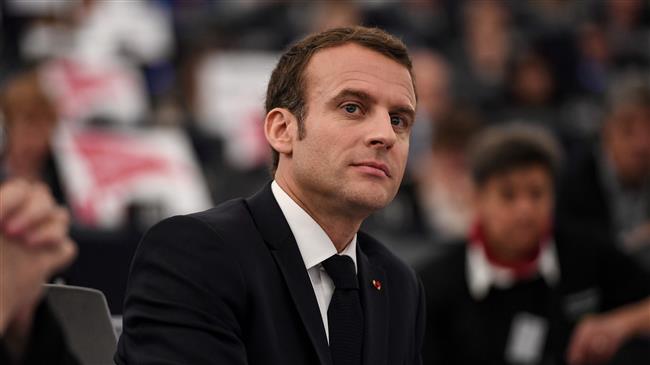'Manifesto' urging Muslim leaders to reject part of Qur'an sparks outrage across France
A letter calling on “Muslim authorities” to reject parts of Islam’s holy book of Qur'an and signed by 300 French public figures – including an ex-president, three former premiers and several MPs – has sparked reaction across France.
“Vile, racist, contemptible, Islamophobic, provocative,” were among the huge responses describing the letter, titled “Manifesto against the new anti-Semitism,” following its publication in Sunday’s edition of French daily Le Parisien and ahead of Wednesday’s release of a book in which 16 French “intellectuals” censure “the new anti-Semitism,” UK-based online news outlet Middle East Eye reported on Thursday.
Signatories of the controversial letter, which was also signed by former president Nicolas Sarkozy, equated Islam with “anti-Semitism” and demanded that “Muslim authorities… strike with obsolescence” verses in the Qur'an calling for “the murder and punishment of Jews, Christians, and non-believers.”
They further warned against “Islamist radicalization” and “a surreptitious ethnic purge” allegedly targeting the Jewish community in the Paris region.
Muslim clerics at mosques from across France were quick to respond to the “manifesto,” warning that it could inflame relations between religious communities in the European nation.

Head of the Great Mosque of Bordeaux, Tareq Obrou, expressed outrage at the divisive letter, pointing out that “attributing anti-Semitism to Islam almost constitutes blasphemy, as two-thirds of the Qur'an’s prophets are Jewish".
“This makes no sense,” he added, further insisting: "The Qur'an does not call for murder, it calls for fighting back against hostile people. This is the same misinterpretation made by a number of ignorant Muslims, delinquents who pick and choose texts depriving them of their historical context."
Oubrou is also a signatory of a response column, which was written by nearly 30 French imams and published Tuesday in another major French daily Le Monde, which condemns terrorism and anti-Semitism, and further discards the conflations made by the now scandalous "new anti-Semitism" manifesto.
“We call on our other fellow citizens, particularly intellectuals and politicians, to be more discerning. Because these criminal practices claimed to be in the name of Islam could in effect confirm clichés already burned into people’s minds," read the Le Monde column.
It further added, "Some have already seen (in this manifesto) a long awaited opportunity to incriminate an entire religion. They no longer hesitate to publicly propagate, including in the media, that the Qur'an itself calls for murder. This pernicious idea is incredibly violent.”
Chief cleric at the Great Mosque of Paris, Dalil Boubakeur, also reacted to the manifesto by underlining, “The unjust and delirious accusations of anti-Semitism leveled against French citizens of Muslim faith and against Islam in this column presents the risk of pitting religious communities against one another."

This is while French author and Journalist Dominique Vida -- who recently published a book titled Anti-Zionism = Anti-Semitism? Response to Emmanuel Macron -- also reacted to the manifesto, writing that “to hold radical Islam as the sole cause of anti-Jewish violence is to ignore an important part of the phenomenon.”
Pointing to the Israeli-Palestinian conflict as the “the great omission of the manifesto,” he wrote: “This cowardice, while probably necessary to bring together such a disparate group (of signatories), is absurd. Who would dare deny it?"
He further emphasized, "The massacres of these past few weeks targeting demonstrations in Gaza, and justified by a number of signatories, provoke more anti-Semitism, for example, than all the pinpointed verses of the Qur'an. When was the last burst of violence against Jews in our country, if not during the brutal repression of the Second Intifada?”
Also writing this week about the gap between the manifesto and the religious and sociological realities of Islam, France’s Jewish essayist and journalist Claude Askolovitch described the text as “chilling, for the truth from which it emerges as well as the lies it induces.”
“The manifesto’s injunction disconcerts by its simplicity. There is no pope in Islam, nor a council that could transform a centralized religion ... Finally, one does not reform by besieging believers.”
Russia downs over 40 Ukrainian drones as Putin vows 'destruction' on Kiev
VIDEO | Yemen: A bone in Israeli neck
D-8’s role in Iran’s economy after Cairo summit
China slams US as ‘war-addicted’ threat to global security
China ‘firmly opposes’ US military aid to Taiwan
VIDEO | Press TV's News Headlines
President Yoon Suk Yeol to be removed from office
At least 19 Gazans killed by Israeli airstrikes since dawn: Medics













 This makes it easy to access the Press TV website
This makes it easy to access the Press TV website